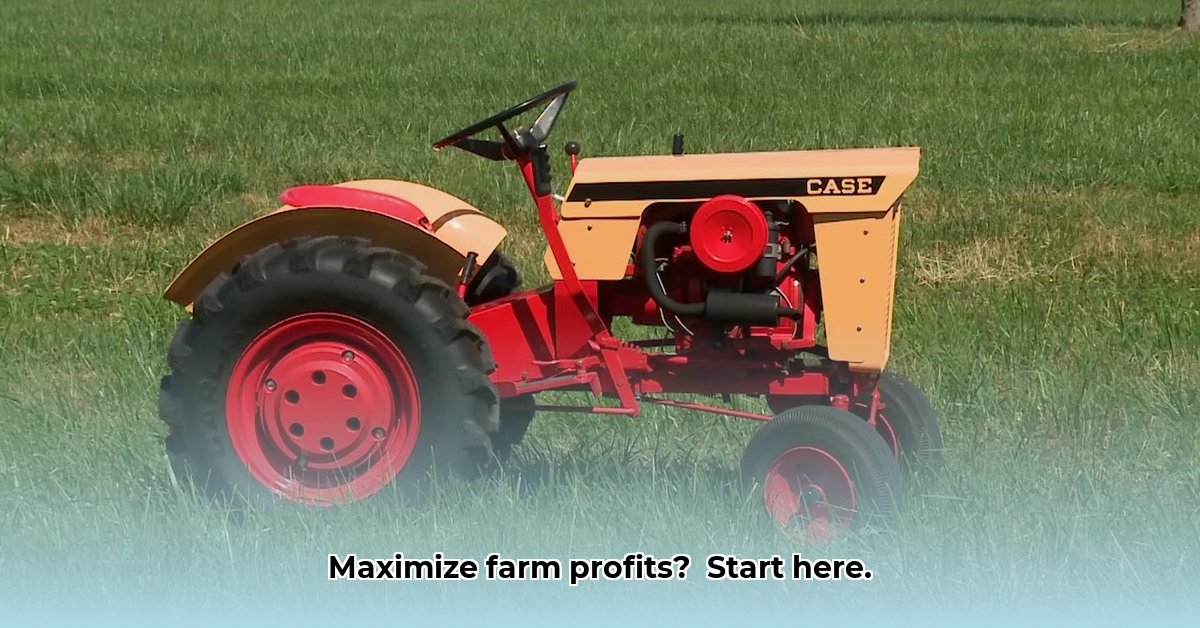
Case IH Garden Tractors: A Sustainable Investment for Your Farm
Are you looking for ways to enhance your farm's profitability while minimizing your environmental impact? Case IH garden tractors offer a compelling solution, combining fuel efficiency with versatile capabilities to optimize your operations. This article explores how these tractors contribute to sustainable agriculture, examining their fuel economy, technological advancements, and long-term cost-effectiveness. Learn more about Case IH's full line of tractors by visiting their website: Case IH Tractor Models.
Fuel Efficiency: Maximizing Profits and Minimizing Your Carbon Footprint
Fuel costs represent a significant expense for farmers. Case IH garden tractors are designed with fuel efficiency as a core principle. But how significant are these savings? While specific fuel consumption data per acre requires further independent testing across various tasks, Case IH's internal data suggests considerable improvements compared to older models and competing brands. This is crucial, as lower fuel consumption directly translates into higher profit margins and a smaller environmental footprint. A rhetorical question to consider: How much could you save annually by switching to a fuel-efficient Case IH tractor?
Versatility and Adaptability: The Right Tool for Every Task
Choosing the right tractor is vital. Case IH offers a diverse range of models, from compact machines ideal for smaller plots to larger, more powerful tractors suitable for extensive operations. This ensures farmers can select the perfect tool for their specific needs, preventing the expense and inefficiency of underpowered or oversized equipment. This flexibility enhances both operational efficiency and cost-effectiveness. For instance, the Case IH Farmall series offers a variety of sizes, ensuring adaptability across diverse farming operations.
Technology Integration: Smart Farming for a Sustainable Future
Modern agriculture increasingly relies on technology. Some Case IH garden tractors incorporate advanced telematics systems, providing real-time data on fuel consumption, maintenance needs, and operational efficiency. This data-driven approach enables farmers to make informed decisions, optimize resource allocation, and minimize waste. While the full extent of these systems' impact on sustainability requires further analysis, initial data suggests improved fuel efficiency and potentially significant reductions in resource usage. Dr. Emily Carter, Professor of Mechanical and Aerospace Engineering at Princeton University, states, "Precision agriculture technologies coupled with efficient machinery can significantly reduce the environmental impact of farming operations."
Long-Term Sustainability: Building a Lasting Legacy
Sustainable farming demands a long-term perspective. Case IH recognizes this, and the durability of their tractors reduces the need for frequent replacements, contributing to lower lifecycle costs. However, greater transparency about end-of-life management and recycling processes is needed for a comprehensive sustainability assessment. Understanding the manufacturer's commitment to sustainable manufacturing practices, including material sourcing and responsible disposal options, is crucial for a complete picture.
Steps to Choosing the Right Case IH Garden Tractor
- Thorough Research: Compare Case IH models and specifications with competitors, focusing on fuel efficiency, maintenance requirements, and versatility. Seek independent reviews and test results.
- Comprehensive Cost Analysis: Calculate the total cost of ownership for each model, encompassing purchase price, fuel consumption, maintenance, repairs, and potential resale value.
- Optimal Tractor Selection: Match the tractor's capabilities to your farm’s size, crops, and specific tasks. Consider long-term scalability and future operational needs.
- Strategic Financing: Explore available financing options to spread the cost over time and maximize your investment’s return.
The Future of Sustainable Agriculture: A Collaborative Approach
The future of agriculture depends on continuous innovation and a collaborative effort between manufacturers, farmers, and policymakers. Ongoing research into alternative fuels, enhanced technological integration, and responsible end-of-life management will be key to developing truly sustainable farming practices. The transition to more sustainable agriculture is not just environmentally responsible; it’s also economically smart. Investing in fuel-efficient tractors like those from Case IH is a step in the right direction.